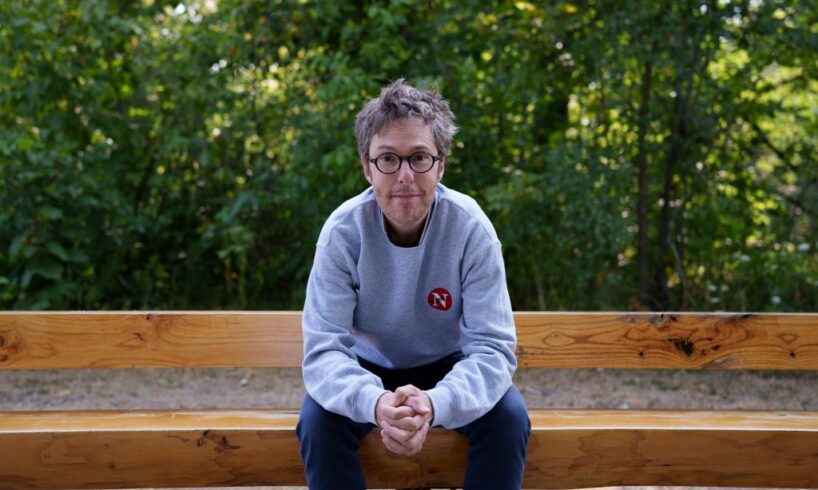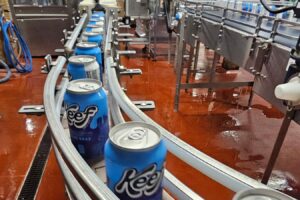
Every good reporter needs a good editor. And we’re all better off when it’s not just one editor … but a whole team of them. That’s why we’ve been adding to our editorial team lately, recently bringing — not one, but two — new assistant editors on board to help make sure our stories are factually accurate, enjoyable to read and beautiful to look at.
Will Pearson is one of them. Will joins The Narwhal after co-founding Peterborough Currents, an independent local news outlet focusing on in-depth and community-centred journalism. That experience got him really thinking about audiences — that’s you, our readers. As the internet continuously changes, Will stays focused on the relationship between journalism and the people it’s meant to serve. He’ll be one of the people answering emails from readers (and yes, we read every single one).
Based in Peterborough, Ont., he knocked our socks off with his obvious passion for non-profit journalism and local news. He’s also something of a renaissance man when it comes to polishing stories and getting them out the door. He’s only a few weeks in and he’s already saved us from many a typo.
Oh, and he can solve a Rubik’s Cube faster than probably anyone you’ve met. Yes, that’s a challenge.
Read on to hear Will’s takes on how to work in a world increasingly muddled by artificial intelligence (AI) — and a portrait of his hometown so heartfelt you might just up and move to Peterborough.
Tell us a bit about yourself! Where did you grow up?
I grew up in Peterborough/Nogojiwanong, Ont., and I’ve continued to live here for most of my life. I like backcountry camping, photography, riding my bike and people of all sorts.
What drew you to journalism?
I started out doing public relations jobs and quickly realized I had made a big mistake — I wanted to serve readers instead of corporations! I am drawn to journalism because I’m curious about the world and I don’t always trust people who have power.
Combining a love of people and the outdoors with a background in philosophy and theology, Will is curious about the world and passionate about connecting people with community-powered journalism.
You co-founded your own local news outlet, Peterborough Currents, and recently transitioned it to become a non-profit. What are your main takeaways about non-profit journalism in Canada?
I learned so much running a local news outlet for five years. One of my biggest takeaways was that traditional practices of newsgathering — and even the news cycle itself — are actually a barrier to informing readers. So much journalism is written with other journalists in mind as the audience, and as a result, it doesn’t really meet audiences where they’re at or answer the questions they’re actually asking. I believe non-profit outlets like The Narwhal are well-positioned to continue innovating new ways of reaching audiences and helping them understand the world.
I also learned that there is a huge pent-up demand for authentic and reliable local storytelling. Especially as AI muddles our feeds and the internet becomes less user-friendly, people are desperate to connect with their communities through local news. So, there’s a big demand for news. There are still challenges involved in building a business model to sustainably meet that demand. Peterborough Currents hasn’t quite succeeded on that front yet, which is one reason why I’m at The Narwhal now. But I’m definitely bullish on the future of independent non-profit news!
What kind of journalism draws you in as a reader? Why?
When people talk about the importance of reliable news these days, they often talk about the importance of an informed citizenry to keep democracy healthy in the current moment. That’s totally true.
But I think there’s something else going on, too. Humans are storytelling creatures. I think that’s because we know our time here is fleeting, and we want to record our existence to make it feel more permanent. In our personal lives, we might do that with journals or family photo albums. In our community lives, we do it through journalism.
So, the stories I like best are the ones that feel like they’ll be worth reading 100 years from now. When we’re all gone, these stories will be a record of our time together and what we thought was worth fighting for.
“Humans are storytelling creatures. I think that’s because we know our time here is fleeting.”
You do so much in Peterborough, from sitting on the editorial board of The River, a local magazine serving the local low-income community, to spending endless hours archiving photos from the local newspaper and helping serve meals for people who are experiencing hunger. You clearly love Peterborough. What are your three favourite things about it?
I do love Peterborough! We haven’t been spared the social and economic challenges most cities are facing these days, but Peterborough still has a lot going for it. You asked for three things, so here they are:
The people. They’re always surprising me and making me chuckle. I especially appreciate the local arts community and all the people who are working in their own unique ways — big and small — to make the city more inclusive and just.
Second, the easy access to green space. There are many beautiful parks and bike trails and even a river to swim in. Forests, wetlands and farmer’s fields are never more than a 15-minute bike ride away.
And third, since it’s summertime, the annual Peterborough Folk Festival! It’s a lovely free festival held next to the river.
When he’s not hard at work polishing our stories, Will enjoys every opportunity to get outside and bike Peterborough’s greenways or swim in the city’s river.
Your educational background sounds fascinating — a mix of philosophy and theology. Can you tell us about it?
You’re digging deep into my past now! Yes, I did my undergraduate degree in philosophy at Trent University and followed it up with a master of arts in theology and religious studies at the Atlantic School of Theology. My graduate work focused on post-colonial interpretations of the Old Testament’s exile narratives.
I’m still interested in those topics, but no longer from an academic perspective. When I was in my twenties, I was more likely to look for meaning in books and ideas. Now, I’m more likely to seek it in my relationships with people and the natural world.
What else do you do when you’re not saving us from typos and helping make stories beautiful at The Narwhal?
These days, I’m watering my garden, hanging out with my niece and nephew and making grand plans for when I can take vacation time!
To borrow a question from The Moose Questionnaire: what’s the most awe-inspiring natural sight you’ve witnessed between the Pacific, Atlantic, 49th parallel and Hudson Bay, i.e. Canada?
Algonquin Park. One spring a couple of years ago, I paddled the Tim River. My partner and I set our alarm for sunrise so we could exit the tent and quickly hop in the canoe, hopeful to see moose. We rounded a misty peninsula and there they were, up to their bellies in swamp water and serenely chomping on aquatic plants. They were disinterested in us, so we were able to paddle close and observe from a few metres away. They were eating breakfast, just like I eat breakfast!
I continue to visit Algonquin and other Ontario provincial parks fairly regularly. “Awe-inspiring” is a good word to describe the experience of encountering these animals just being themselves on the land. I haven’t seen a bear in the wild yet, but I’d like to.
What are three things people might not know about you?
I can solve a Rubik’s Cube in under a minute. I develop black-and-white photos in my home darkroom. I dream of opening an independent grocery store to challenge Peterborough’s chain retailers and give people a cheaper and more community-oriented way to buy food.





